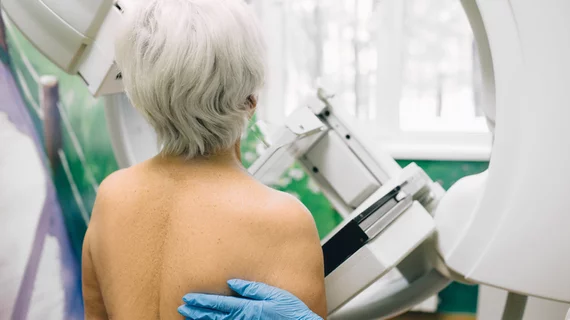Access isn’t enough; other unmet needs keeping patients from using screening mammography
Giving patients access to imaging is not enough, with other unaddressed needs keeping them from utilizing screening mammography, according to new research published Wednesday.
Women with an increasing number of unmet social needs—such as issues with utility services and childcare access—face decreasing odds of attending their imaging appointments. Patients with such impediments also are more likely to present to radiology practices with late-stage disease, experts detailed in JAMA Network Open [1].
For imaging providers and referrers, the key takeaway is to consider assessing patients both for breast cancer, along with any personal challenges that impact their ability to make appointments.
“By incorporating social needs screening into healthcare and developing interventions to overcome them, breast cancer outcomes can be improved,” Neha Goel, MD, with the department of surgery at the University of Miami, and colleagues wrote Feb. 14. “In turn, partnerships between hospitals, social workers, and communities should aim to develop targeted interventions to overcome barriers to screening utilization and unmet social needs to increase early stage diagnosis, a direct mediator of improved survival outcomes, even in high-income countries with access to screening mammography,” they added later.
For the study, Goel et al. analyzed data from patients diagnosed with stages 1-4 invasive ductal or lobular carcinoma, imaged at an academic system between 2020 to 2023. This included both an underserved safety-net hospital and a National Cancer Institute-designated facility.
The study incorporated a total of 322 women who met the criteria and completed the Health Leads Social Needs Screening Toolkit—an instrument for assessing common social needs impacting patient health. Of those, 76% (or 250 patients) with access to city-funded screening mammography completed an exam. Those treated at the safety-net hospital were more likely to present with late-stage disease than earlier forms of cancer (31% vs. 18%).
Meanwhile, not completing a screening appointment was associated with having a rising number of unmet social needs (odds ratio, 0.74) and increasing age at diagnosis (OR, 0.92). Such unaddressed social challenges also had a strong correlation with late-stage diagnosis, “above and beyond mammography” (OR, 1.38). As one example, patients with advanced forms of breast cancer supported more children under age 18 compared to those with earlier forms of the disease.
“This association transcended recruitment site [safety-net hospital vs. academic medical center], indicating that patients in either hospital setting may benefit from unmet social needs screening to overcome access to care barriers associated with late-stage disease at diagnosis,” the authors noted.
Read more about the results, including potential study limitations, at the link below.

